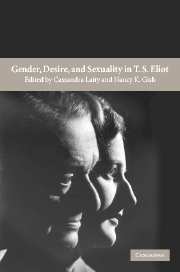Book contents
- Frontmatter
- Contents
- Acknowledgments
- Notes on contributors
- Introduction: Eliot, gender, and modernity
- Part I HOMOEROTICISMS
- Part II DESIRE
- Chapter 5 Discarnate desire: T. S. Eliot and the poetics of dissociation
- Chapter 6 Mimetic desire and the return to origins in The Waste Land
- Chapter 7 Theorizing emotions in Eliot's poetry and poetics
- Part III MODERN WOMEN
- Index
Chapter 5 - Discarnate desire: T. S. Eliot and the poetics of dissociation
Published online by Cambridge University Press: 22 September 2009
- Frontmatter
- Contents
- Acknowledgments
- Notes on contributors
- Introduction: Eliot, gender, and modernity
- Part I HOMOEROTICISMS
- Part II DESIRE
- Chapter 5 Discarnate desire: T. S. Eliot and the poetics of dissociation
- Chapter 6 Mimetic desire and the return to origins in The Waste Land
- Chapter 7 Theorizing emotions in Eliot's poetry and poetics
- Part III MODERN WOMEN
- Index
Summary
A blind, dirty, senile old man haunts the margins of Eliot's 1910 poem “First Debate between the Body and Soul.” Along with a cast of characters in Inventions of the March Hare – clowns, actors, marionettes – he inserts himself in the consciousness of Eliot's narrators as both self and other, a voice at once within and without the “I” who ostensibly speaks. Unlike Eliot's theatrical personae, this often vile, chattering, drunken, or mad old man carries with him a horror of self-representation little mediated by a stage setting or controlled script. Similar figures appear in other poems, notably “Dans le Restaurant” and “Hysteria.” Yet he plays one role among many; in other forms, alien and intimate figures serve, in Eliot's work, both to claim and to disavow desire. For example, the marionettes – “my marionettes” – of “Convictions (Curtain Raiser)” are filled with naive and exaggerated desires carefully detached from the narrator who also claims them: they “Await an audience open-mouthed / At climax and suspense” and have “keen moments every day.” The narrator of “The Little Passion from ‘An Agony in the Garret’” observes himself walking and notes, sardonically, his own “withered face” as if in a mirror behind a bar: speaker and other are strangely indistinguishable.
That Eliot's poetry, especially the early work, depicts states of internal division, disorder, doubling, or multiple voices is well known.
- Type
- Chapter
- Information
- Gender, Desire, and Sexuality in T. S. Eliot , pp. 107 - 129Publisher: Cambridge University PressPrint publication year: 2004
- 2
- Cited by



